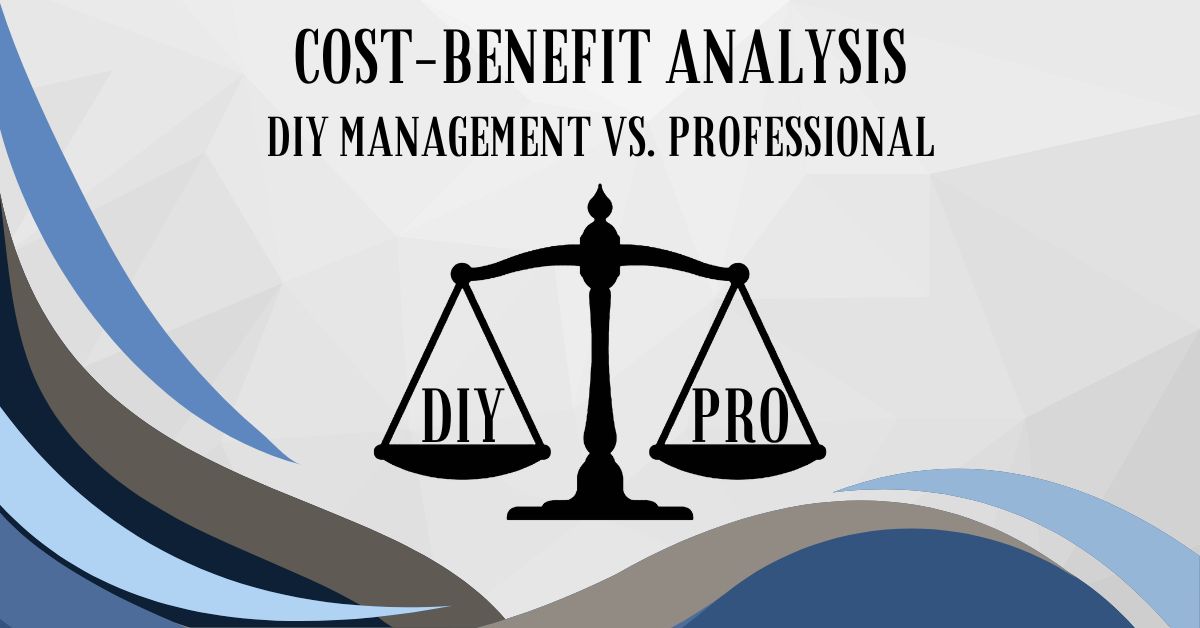Managing rental properties is a significant undertaking that can influence your bottom line and the success of your investment. As a landlord or real estate investor, one of the critical decisions you'll face is whether to handle property management yourself or hire a professional property management company. This blog provides a detailed cost-benefit analysis to help you make an informed decision. We will explore the pros and cons of DIY property management and hiring professionals with practical insights and financial comparisons.
Understanding DIY Property Management
What is DIY Property Management?
DIY (Do-It-Yourself) property management involves landlords handling all aspects of managing their rental properties without the assistance of a professional management company. This approach requires significant involvement and a hands-on approach to managing tenants, maintenance, and administrative tasks.
Common Responsibilities
Tenant Screening: Advertising vacancies, conducting background checks, and interviewing prospective tenants.
Lease Management: Drafting and signing lease agreements, handling renewals, and enforcing lease terms.
Rent Collection: Collecting monthly rent, tracking payments, and addressing late payments.
Property Maintenance: Coordinating repairs, regular maintenance, and emergency responses.
Legal Compliance: Ensuring adherence to local landlord-tenant laws and regulations.
Initial Costs and Setup
The initial costs for DIY property management are generally lower than hiring a professional. However, landlords must invest in tools and resources to manage their properties effectively, such as property management software, legal resources, and marketing expenses for vacancies.
Understanding Professional Property Management
What Does Hiring a Professional Property Management Company Entail?
Hiring a professional property management company means outsourcing the management of your rental properties to experts who handle everything from tenant relations to maintenance and legal compliance. This option is for landlords who own multiple properties or lack the time and expertise to manage properties.
Services Offered
Tenant Screening and Placement: Finding and vetting tenants to fill vacancies.
Rent Collection and Financial Reporting: Managing rent payments, providing financial reports, and handling evictions if necessary.
Maintenance and Repairs: Coordinating routine and emergency maintenance with a network of trusted contractors.
Lease Management: Drafting, renewing, and enforcing lease agreements.
Legal Compliance: Ensuring all activities comply with local, state, and federal laws.
Cost Structure
Professional property management companies typically charge a percentage of the monthly rent, ranging from 8% to 12%, depending on the location and services provided. Additional fees may include leasing fees, maintenance surcharges, and eviction costs.

Pros and Cons of DIY Property Management
Pros
Cost Savings
One of the primary advantages of DIY property management is cost savings. By managing the property yourself, you eliminate management fees, which can significantly impact your profit margins.
Control
DIY property management gives you complete control over all decisions related to your property. You can personally select tenants, set rental rates, and handle maintenance issues according to your standards.
Personal Touch
Direct interaction with tenants allows you to build relationships and address their needs promptly, potentially leading to higher tenant satisfaction and retention.
Cons
Time-Consuming
Managing a rental property requires a substantial time commitment. Tasks such as tenant screening, maintenance coordination, and rent collection can be demanding and time-consuming.
Lack of Expertise
Unless you have a background in property management, you may lack the necessary expertise to handle all aspects efficiently. It can lead to mistakes, legal issues, and increased stress.
Stress and Liability
Handling tenant issues, legal disputes, and maintenance emergencies can be stressful and expose you to significant liability risks.
Pros and Cons of Hiring Professional Property Management
Pros
Expertise and Experience
Professional property managers bring a wealth of knowledge and experience to the table. They are well-versed in industry best practices, legal requirements, and efficient management strategies.
Time Savings
Hiring a property management company frees up your time, allowing you to focus on other aspects of your life or business. It is particularly beneficial for landlords with multiple properties or full-time jobs.
Tenant Screening
Professional managers have refined tenant screening processes that help attract reliable tenants, reducing the risk of late payments, evictions, and property damage.
Maintenance and Repairs
Property management companies have established relationships with contractors and service providers, ensuring timely and cost-effective maintenance and repairs.
Legal Compliance
Staying compliant with local, state, and federal laws can be challenging. Professional managers ensure all activities are legally compliant, reducing the risk of fines and legal disputes.
Cons
Cost
The most significant drawback of hiring a property management company is the cost. Management fees and additional charges can reduce your overall profitability.
Less Control
Outsourcing management means relinquishing some control over daily operations and decision-making. It can be challenging for hands-on landlords who prefer direct involvement.
Finding the Right Manager
Selecting a reputable and reliable property management company is crucial. A poor choice can lead to mismanagement, increased vacancies, and dissatisfied tenants.

Financial Comparison: DIY vs. Professional Property Management
Cost Analysis
DIY Property Management Costs
- Marketing and Advertising: $100 — $500 annually
- Property Management Software: $200 — $600 annually
- Maintenance and Repairs: Variable, typically $500 — $2,000 annually
- Legal Resources and Compliance: $200 — $500 annually
Professional Property Management Costs
- Management Fees: 8% — 12% of monthly rent
- Leasing Fees: Typically 1-month's rent
- Maintenance and Repairs: Often marked up by 10% — 20%
- Eviction Costs: $200 — $500 per eviction
Potential Savings
Landlords can save on management fees and leasing costs by opting for DIY management. Comparing savings against the value of time and potential inefficiencies will give a partial cost-benefit analysis.
Long-Term Financial Impact
While DIY management can lead to short-term savings, professional management may provide better long-term financial outcomes through efficient operations, reduced vacancies, and higher tenant retention.
Factors to Consider When Choosing Between DIY and Professional Management
Property Size and Location
Large properties or multiple units can benefit more from professional management due to their increased complexity and workload. Additionally, properties in competitive or high-demand markets may require professional expertise to maximize returns.
Personal Experience and Availability
Assess your own skills, experience, and time availability. If you have property management experience and the time to dedicate, DIY management might be viable. Otherwise, professional management could be more practical.
Financial Goals
Consider your long-term financial goals and how management costs align with them. Professional management might result in higher net returns through efficient operations and reduced vacancies.
Risk Tolerance
Evaluate your comfort with potential risks and liabilities. Professional managers can help mitigate risks through expertise and adherence to legal standards.
Tips for Successful DIY Property Management
Educational Resources
Books: "The Book on Managing Rental Properties" by Brandon Turner
Courses: Online property management courses from platforms like Udemy or Coursera
Websites: Resources from the National Association of Residential Property Managers (NARPM)
Tools and Software
Property Management Software: Buildium, AppFolio, or Rentec Direct
Accounting Tools: QuickBooks for rental property accounting
Maintenance Management: Maintenance tracking apps like Property Meld
Networking
Build a network of reliable contractors, real estate attorneys, and fellow landlords to share knowledge and resources.

Tips for Hiring the Right Property Management Company
Research and Referrals
Seek referrals from other landlords, real estate agents, or investment groups, and research online reviews and ratings to assess the reputation of potential companies.
Interview Questions
What services do you offer?
How do you handle tenant screening and placement?
What are your fees and additional charges?
How do you manage maintenance and repairs?
Can you provide references from current clients?
Contract and Agreement
Review the management contract thoroughly. Ensure it clearly outlines services, fees, responsibilities, and termination clauses. Negotiate terms that align with your needs and goals.
Conclusion
Deciding between DIY property management and hiring a professional management company is a significant decision that depends on various factors, including your experience, time availability, financial goals, and risk tolerance. By weighing the pros and cons, conducting a thorough cost-benefit analysis, and considering real-life examples, you can make an informed choice that aligns with your unique situation and objectives.
Whether you manage your properties yourself or hire professionals, the key is to stay informed, use the right tools and resources, and continuously evaluate your strategy to ensure it meets your investment goals.
References
Zillow. (2023). Denver Rental Market Data. Retrieved from Zillow
U.S. Census Bureau. (2023). Denver Population Growth Statistics. Retrieved from U.S. Census Bureau
National Association of Residential Property Managers (NARPM). Retrieved from NARPM
Buildium. Property Management Software. Retrieved from Buildium





